REPORT of the 2017 World Network Meeting
of the Global Alliance for Musculoskeletal Health
A Great Success!
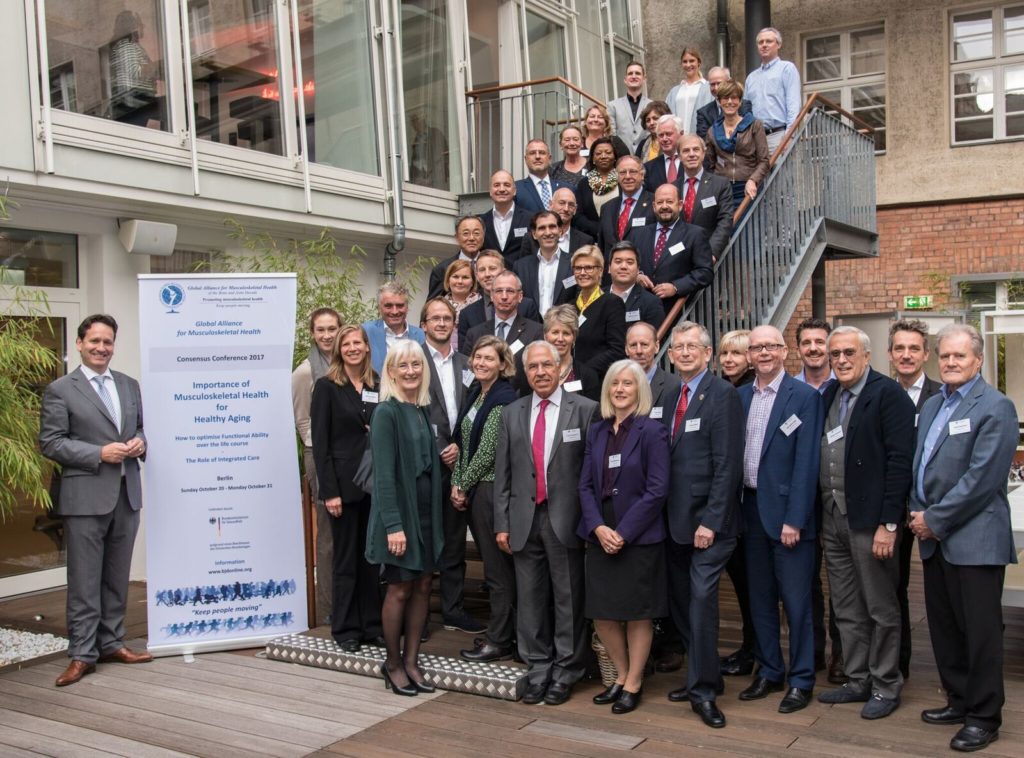
The Global Alliance for Musculoskeletal Health (GMUSC) held its 2017 World Symposium in Berlin, Germany in October 2017. The theme “Importance of Musculoskeletal Health for Healthy Ageing” generated robust discussion about the importance physical capacity through good musculoskeletal health relative to healthy ageing. The meeting was well attended with delegates coming from all corners of the world, representing diverse populations, diverse professions and patients bringing their valuable and unique perspectives to the discussion. Presentations and workgroups explored the need for governments, health systems, and communities to invest in musculoskeletal health throughout the life course. This was widely held as central to facilitating functional ability, defined by the WHO as both an individual’s intrinsic capacity and environmental factors. A general call was made to prioritize musculoskeletal health at a level commensurate with the burden of musculoskeletal disease and disability, and to engage a multidisciplinary workforce to address this issue.
This year’s GMUSC symposium was highly innovative, resulting from excellent collaboration between GMUSC, the World Health Organization Ageing and Life Course Program, the Ministry of Health of Germany and the Ministry of Health and Social Care of Japan who funded the event. Unique to this year’s symposium was a joint half day meeting with representatives from the World Health Organization Global Consensus Meeting on Integrated Care for Older People (ICOPE) where speakers from the WHO and GMUSC discussed the importance of maintaining mobility and functional ability in older years.
Day 1
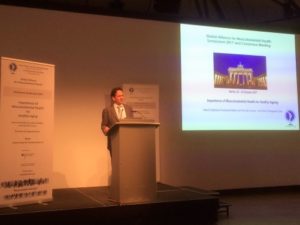 The theme for Day One of the G-MUSC World Network Conference was “The Importance of Musculoskeletal health for Healthy Ageing” and was opened by Karsten Dreinhöfer Chair of the International Coordinating Council of G-MUSC
The theme for Day One of the G-MUSC World Network Conference was “The Importance of Musculoskeletal health for Healthy Ageing” and was opened by Karsten Dreinhöfer Chair of the International Coordinating Council of G-MUSC
The symposium brought together leadership and key opinion leaders from professional, scientific and patient organisations relevant to musculoskeletal health from around the globe along with policy makers.
The morning saw presentations from a number of speakers on various topic outcomes including:
Professor Anthony Woolf who gave a very interesting presentation about “Why musculoskeletal health is important in older people”.
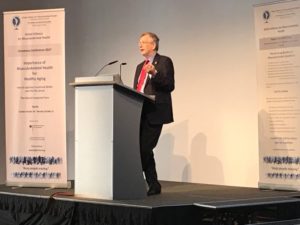
Neil Betteridge provided a patient perspective about Understanding what people with musculoskeletal conditions need.
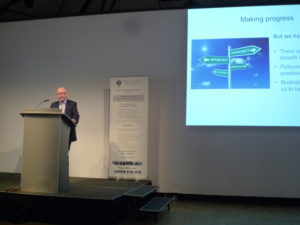
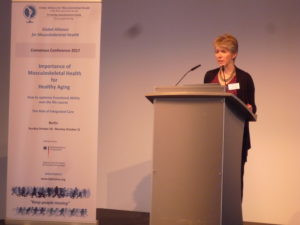
Helen Foster who presented the startling statistic that 1 in 1000 children have some form of arthritis, making it as common as epilepsy, and that investment in musculoskeletal health at an early age is essential to enable healthy children to become healthy adults.
Rhona McGlasson who discussed the importance of physical activity in older people.

And Toby King who talked about the many challenges that must be overcome to implement effective interventions.
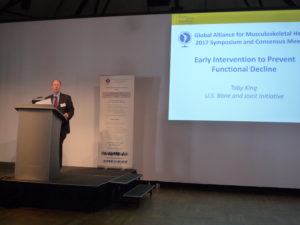
Other speakers included Andrew Briggs with an interesting insight into the WHO’s approach on integrated care for older people; Mieke Hazes who spoke about the challenge in meeting patient needs through shared decision making; Marcos Musafir who presented on integrated care to improve outcomes following trauma in older people; Christoph Gutenbrunner who spoke about the importance of rehabilitation in health systems; Damian Hoy with an interesting presentation about quality indicators of integrated care and Mellick Chehade on the challenges of building a health workforce capacity to deliver integrated musculoskeletal care.
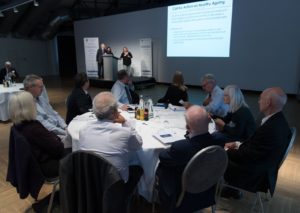
This set the scene for interactive sessions in the afternoon where delegates were able to participate in workshops to develop principles of integrated person-centred care, supported by examples of best practice, and designed to enable others to establish this approach across the globe. It was an opportunity for our community to show leadership in this change in healthcare delivery that is being promoted to deal with the growing burden of chronic diseases and an ageing population.
Day One concluded with the Annual General Meeting of G-MUSC followed by the Network Dinner in the spectacular setting of the restaurant on top of the famous Reichstag- the German Parliament Building. This is the only parliament in the world that houses a public restaurant.
DAY 2
The morning of Day Two was a Joint Session of GMUSC and the WHO to explore the theme “Integrated Care – the path to Universal Health Coverage”.
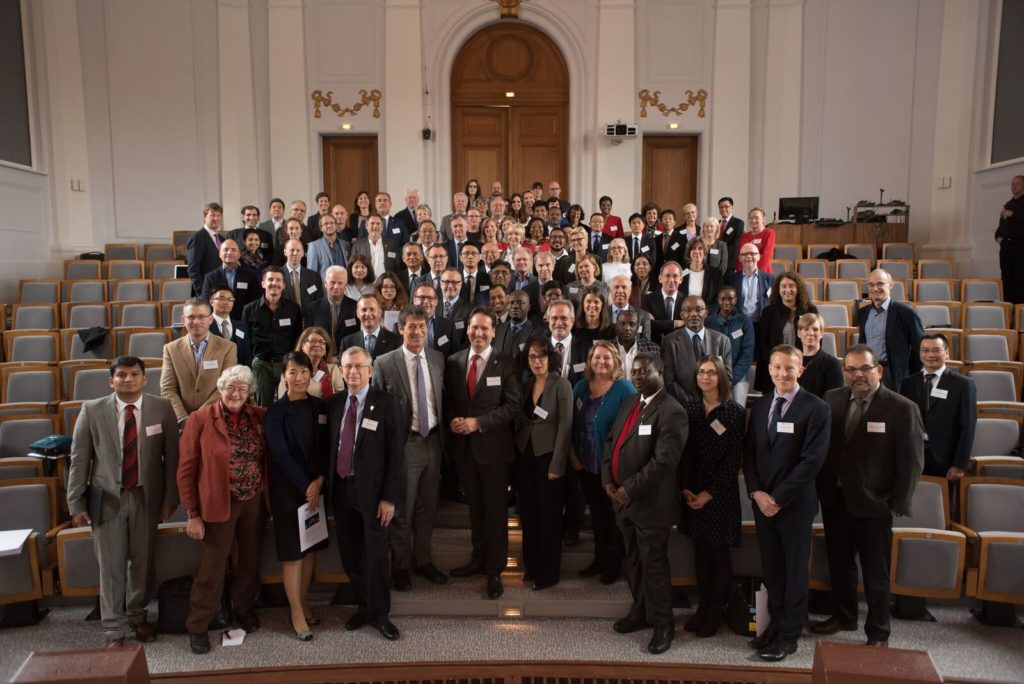
Dr. Karsten Dreinhoefer, Dr. Anthony Woolf and Dr. Deborah Kopansky-Giles of GMUSC were invited as speakers in the combined morning program. Delegates for the ICOPE meeting also represented several country states (Ministries of Health), experts in the areas of integrated care, policy makers, musculoskeletal health and healthy ageing and researchers engaged in studying this area of work.
For the WHO John Beard began by discussing what older people want in terms of basic needs, mobility, contribution, decision making capability and relationships; supported with a reminder of the three issues to consider: care, services and systems. Dr. Beard made the important observation that expenditure on ageing populations is not a cost, it’s an investment.
This was followed by Islene Araujo de Carvalho of the WHO talking about their approach to integrated care for older people and that healthy ageing is not about the absence of disease but is much more about doing what we value.
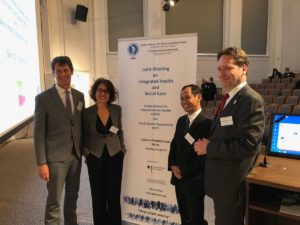

John Beard, Islene Araujo de Carvalho, Karsten Dreinhoefer Islene Araujo de Carvalho, Deborah Kopansky-Giles
Paul Ong of the WHO, speaking about Universal Health Care and research priorities made the important point that health is a social right and not a commodity, privilege or perk.
Other speakers included Mr Anung Sugihantono, from the Ministry of Health, Indonesia who presented on the health and social care needs of older people in Indonesia; Nuria Toro-Polanco who spoke about the key components and opportunities for integrated approaches for sustaining physical capacity in life’s later years and Andrew Briggs who presented on an integrated approach to deliver health and social care.
The session was used as an opportunity to discuss Integrated health and social care for older people to maintain physical capacity and independence and to understand what is meant by person centered care and Universal Health Care for older people and for the WHO to explain their next steps towards promoting healthy ageing and integrated care.
The afternoon of Day Two saw the conclusion of the G-MUSC World Network Conference with an update on the work of the G-MUSC Task Forces now overseen by Margareta Nordin, ICC member. Task Forces presented in the areas of Pediatrics (Helen Foster), Fragility Fractures, Education (Mellick Chehade), Research (Kristina Akesson), Surveillance (Damian Hoy) and National and Regional Cooperation (Jakob Lothe). This was followed by a discussion about collaborative working for integrated MSK care over the life-course.

One of the primary outcomes for the GMUSC meeting is the development of a position paper on Integrated Musculoskeletal Health Care. Attendees debated seed statements for this consensus-driven position paper which kick-started an upcoming Delphi type process to fully develop this position paper. The Conference concluded with a Consensus Statement that drew together the collected wisdom for the two days of the conference.
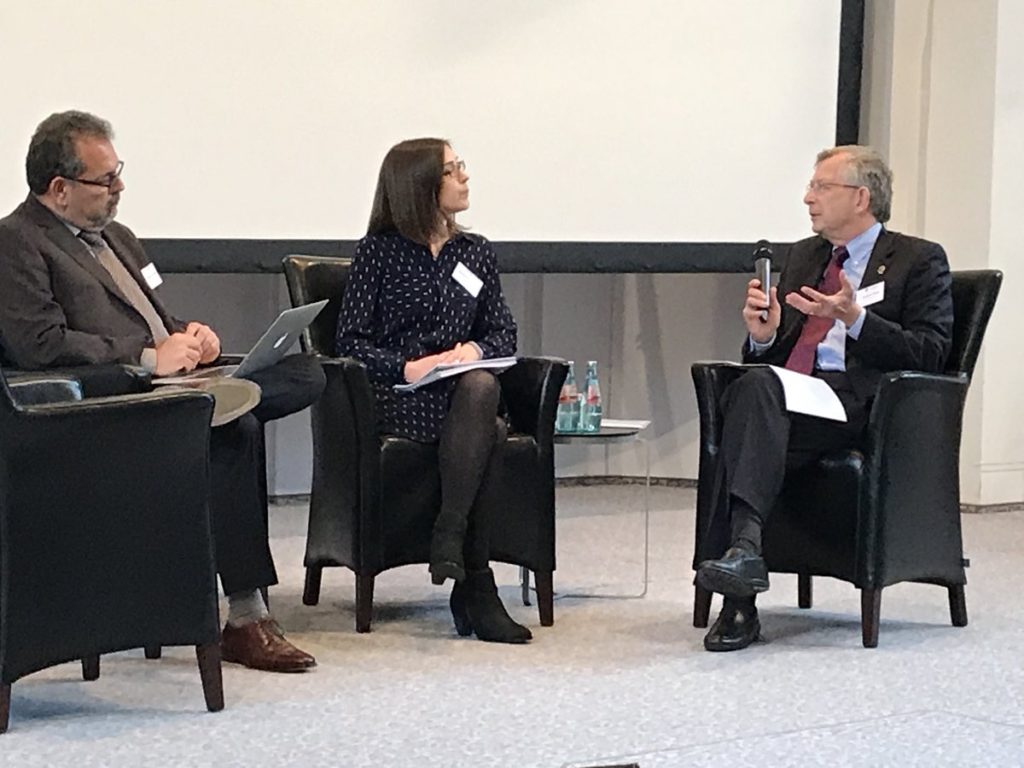
Anthony Woolf in the ‘fishbowl’
All conference attendees will have the opportunity to continue to the future work of this report, as well as a broader audience of stakeholders in the coming months, for the purpose of shaping final recommendations for integrative musculoskeletal health care policy. The outcome of the meeting, as requested by the German Ministry of Health, will be a position paper on Integrated Musculoskeletal Care for Older People, expected to be delivered by early summer of 2018.
The importance of musculoskeletal health has been recognized by the European Regional Office of the WHO in its Non-Communicable Diseases program. Through this collaborative conference, GMUSC has strengthened its relationship with WHO through Integrated, People-Centered Health Services, Disability and Rehabilitation and the WHO Ageing and Life Course programs. The WHO has developed Integrated Care for Older People (ICOPE) in response to this prioritization; meeting participants had the opportunity to learn about the program and discuss strategies to advance this work. ICOPE outlines community-based approaches to help to reorient systems toward person-centered, and coordinated health and social care models for older people.
Berlin 2017 was a resounding success and it was great to see the improvement of musculoskeletal function being presented as a key component of WHO integrated care for older people. It was also a demonstration of great collaboration between the musculoskeletal community and the WHO and it was a fantastic joint meeting to start up the global consultation on integrated care.
